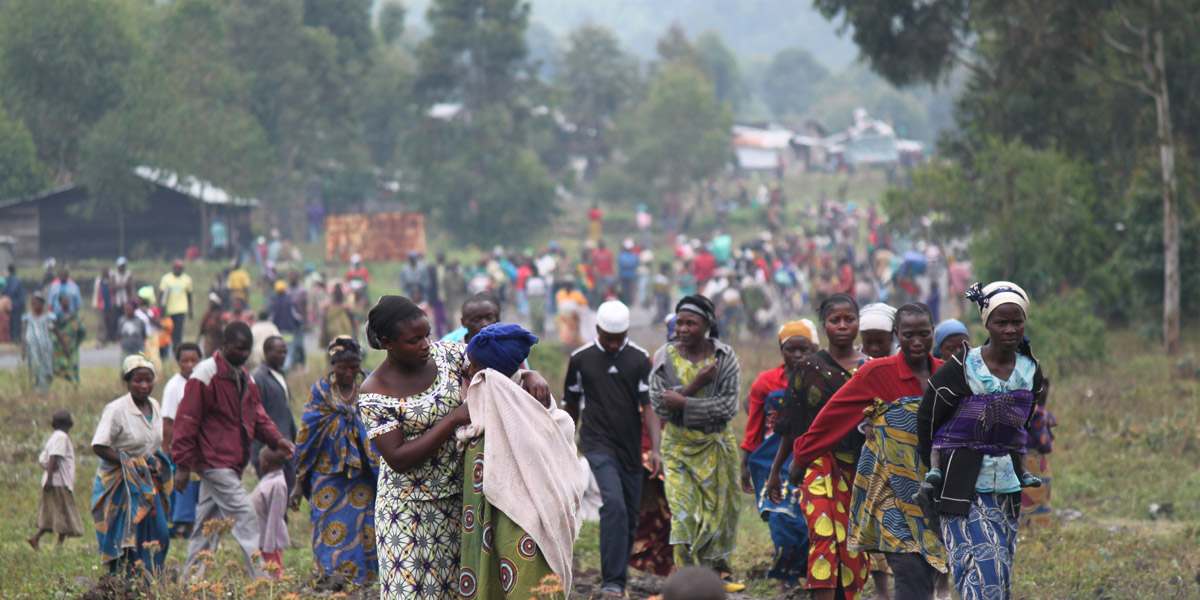The sustainable development goals come to the world and the UK
In 2013 I travelled to the eastern Democratic Republic of the Congo (DRC). On my way I met a woman who worked in irunga national park as a conservationist. Her primary role was to protect the gorilla population in the...
In 2013 I travelled to the eastern Democratic Republic of the Congo (DRC). On my way I met a woman who worked in irunga national park as a conservationist. Her primary role was to protect the gorilla population in the forest. She admitted, however, that her job had increasingly become focused on human development rather than simply conservation. That was because human activity had become the greatest danger to the natural environment in the park. The eastern DRC suffers extreme levels of poverty, despite the abundance of natural mineral wealth in the region. The way that communities in the forest were living and working, for example in producing charcoal, were destroying the forest habitat.
Conflict and armed militia activity in the forest also threatened the natural environment. Direct destruction was being wreaked by armed confrontations and the use of the forest for shelter. At the same time, trade in bush meat and other commodities found in the forest was being used to fund the militias’ activities. When the conservationist talked of her stakeholders, they included these armed groups. She would have been one of the few Europeans to actively engage with the militia groups. Her work demonstrated the close and growing connection between social and economic development, environmental protection and peace.
This connection is reflected in the UN’s new 2030 Agenda for Sustainable Development and the Sustainable Development Goals (SDGs) which it contains. For sustainable development is about making progress on a number of different, but interlinked challenges that touch the lives of everyone across the globe.
The 2030 Agenda was adopted by heads of state and governments in September 2015. It represents the culmination of years of consultation and negotiations to determine what would follow the Millennium Development Goals (MDGs) after they reached the end of their life. This new framework has been designed to celebrate the successes of the MDGs, address any unfinished business and present a more ambitious and transformative vision for a better, more inclusive and sustainable world.
Contained within the 2030 Agenda are 17 Sustainable Development Goals with 169 targets – and an impressive 230 indicators – which cover all areas of sustainable development from poverty and inequality to consumption and production, and health, education, climate change and governance. The SDGs came into effect on 1 January 2016, and like the MDGs are expected to guide international development policy and practices over the next 15 years.
The SDGs are different from the MDGs in two very fundamental ways. Firstly, they are designed to ‘leave no one behind’. The MDGs called for a proportional reduction in many of the issues they covered, for instance reducing extreme poverty by half or maternal mortality by 75 per cent. The unintended consequence of this approach was that governments often failed to achieve progress in the most marginalised communities and targeted easy to reach groups instead.
Secondly, the SDGs have been designed with the principle of ‘universality’ at their core. This is truly radical. It means that all countries – whether developing or so-called developed – have a responsibility to achieve the goals. The aim is to break down the old divisions between developed and developing countries and encourage all countries to accelerate their journey towards sustainable development. As a developed country and major international donor, the UK has three main roles in helping to achieve the goals:
- Helping developing countries to achieve the goals through both diplomatic activity and development policy and programming
- Working to achieve the goals domestically
- Working to ensure that UK action on the SDGs domestically supports sustainable development globally
My pamphlet, Our Shared Responsibility is focused on what the UK is doing domestically to achieve the goals, as opposed to its work to help achieve the goals overseas. It will consider where we are now, where we need to go and how we can make progress against the goals. It also makes recommendations about how to raise awareness of the goals, how the government should organise itself to implement the goals, and the opportunity civil society, the private sector and political organisations have to use this framework as a tool to empower citizens to create change in their communities.
Despite my pamphlet’s focus on the UK national government, it also recognises the responsibility of government at all levels, including the devolved administrations and local government, to implement strategies, set budgets and monitor progress against the goals. It is a call to all political parties, at all levels of government, to take the agenda seriously and step up their role in holding government to account for its commitments. This is particularly important as parties formulate their manifestos ahead of the general election in June. The 2030 Agenda is a 15-year plan and will be relevant to whoever assumes power in the years to come.
The SDGs are an ambitious and potentially transformative framework designed to articulate a vision for the type of world we want to build collectively. They resonate strongly with progressive values and provide an opportunity to transform the UK socially, economically and environmentally. They are a set of goals agreed by every country in the world, including our own. They are an opportunity to bring together in partnership different stakeholders and find joint solutions to highly interdependent issues. We all can and should be playing a prominent role in ensuring that we achieve them.
Our Shared Responsibility won the Jenny Jeger prize for longer writing 2017

